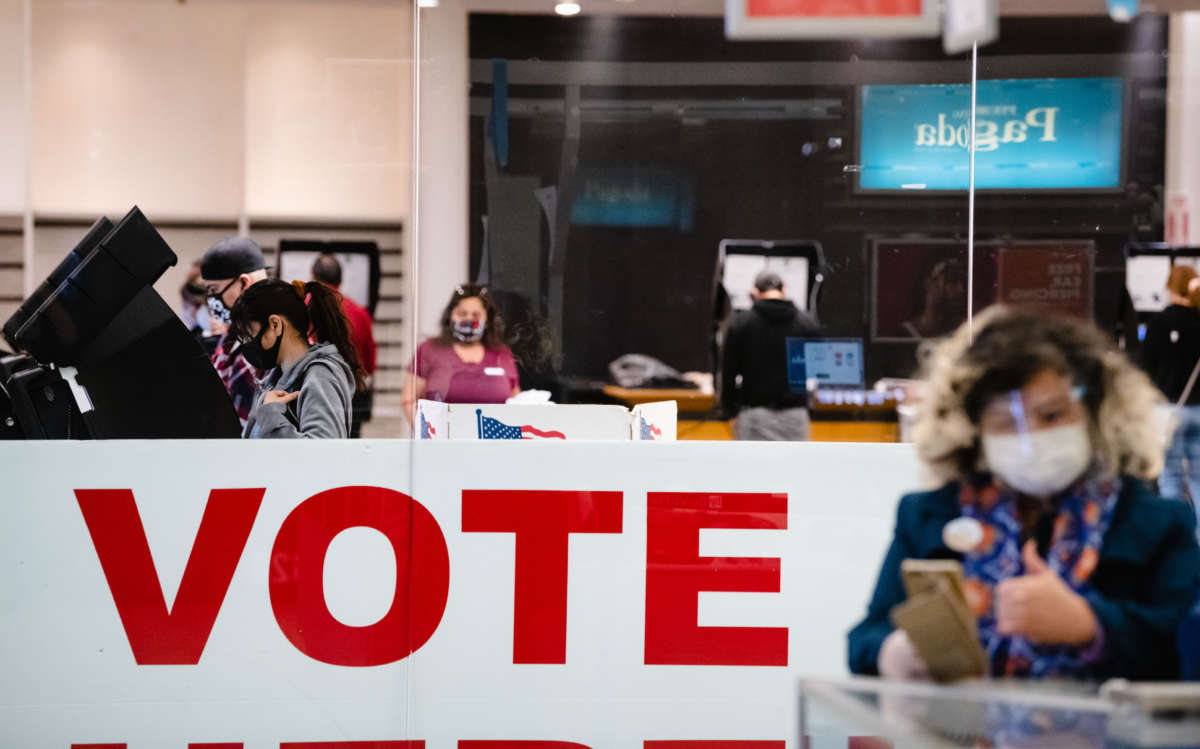Did you know that Truthout is a nonprofit and independently funded by readers like you? If you value what we do, please support our work with a donation.
At least 13 other states are looking into implementing laws similar to a provision in the voter suppression package recently passed in Georgia that severely restricts local election officials’ authority over how elections are conducted.
The law passed last month by Republicans in Georgia opens floodgates where there were previously checks and balances in the state’s election system. It removes the secretary of state as the head of elections, allows the Republican-controlled legislature to fill the election board with handpicked officials, and then gives the board sweeping powers to replace local election officials with their own chosen superintendents.
It also grants Georgians unlimited challenges to any voters’ eligibility — something that right-wing groups tried and failed to do to voters of color in the state in 2020 in an attempt to get hundreds of thousands of ballots thrown out. Under the new law, it’s easier for those sorts of challenges to succeed as they would be considered by the very county boards whose members are appointed by the Republican legislature.
Now over a dozen states are considering similar bills, FiveThirtyEight reports, some of which criminalize local election officials for stepping out of line. Local election officials were “one of the last lines of defense,” The New York Times wrote, against former President Donald Trump’s unfounded challenges to the results of the 2020 election.
In Iowa, Republicans passed a voter suppression package making it a felony for election officials to fail to perform their duties or follow orders from the secretary of state. It also imposes a $10,000 fine on officials for “technical infractions.”
In Arkansas, a bill in committee allows the state’s election board to take over the administration of local elections, similar to the Georgia bill. Another four bills have passed through one chamber of the legislature that give state politicians more control over how elections are run. The laws allow partisan county election boards to dictate how elections are run and bans the mailing of unsolicited absentee ballot applications, among other things.
States like Tennessee, Connecticut, New York, Arizona, New Jersey, and more are all considering measures to prohibit election officials from sending unsolicited applications for mail-in ballots, unsolicited ballots or both.
The Texas House recently passed a bill through committee that makes it a felony for election officials to send unsolicited applications to vote by mail or even encourage people to file an application to vote by mail. A separate bill that passed the State Senate would also bar local election officials from encouraging people to vote by mail and would implement fines on election officials who fail to remove a voter from the voter rolls within a month.
Something of particular concern in Texas is that the legislature has also kept major election bills under wraps by not posting them online for a reasonable amount of time for public review. Houston Chronicle’s Jeremy Wallace wrote on Twitter that Texas state legislators are making a habit of heavily amending election bills and passing them without posting the final bills for the public to view.
This makes it harder for Wallace to report on what’s in the bills, he explained. “But the real problem is everyday Texans have no way to read what is being voted out of committees and voted off the floor when this happens,” Wallace wrote. “This is not normal. In other State Legislatures I’ve covered over the years, there can be a printing delay. But I’ve never had to wait 5 days to see what a committee passed out.”
These bills are all part of a wave of bills targeting elections that have been filed across the country. The Brennan Center reported at the beginning of this month that 361 bills have been filed just since the beginning of this year. Many of the bills are Republican led and are targeted at restricting voting for Black voters and other nonwhite communities.
Matching Opportunity Extended: Please support Truthout today!
Our end-of-year fundraiser is over, but our donation matching opportunity has been extended! All donations to Truthout will be matched dollar for dollar for a limited time.
Your one-time gift today will be matched immediately. Your monthly donation will be matched for the whole first year, doubling your impact.
This matching gift comes at a critical time. As Trump attempts to silence dissenting voices and oppositional nonprofits, reader support is our best defense against the right-wing agenda.
Help Truthout confront Trump’s fascism in 2026, and have your donation matched now!
